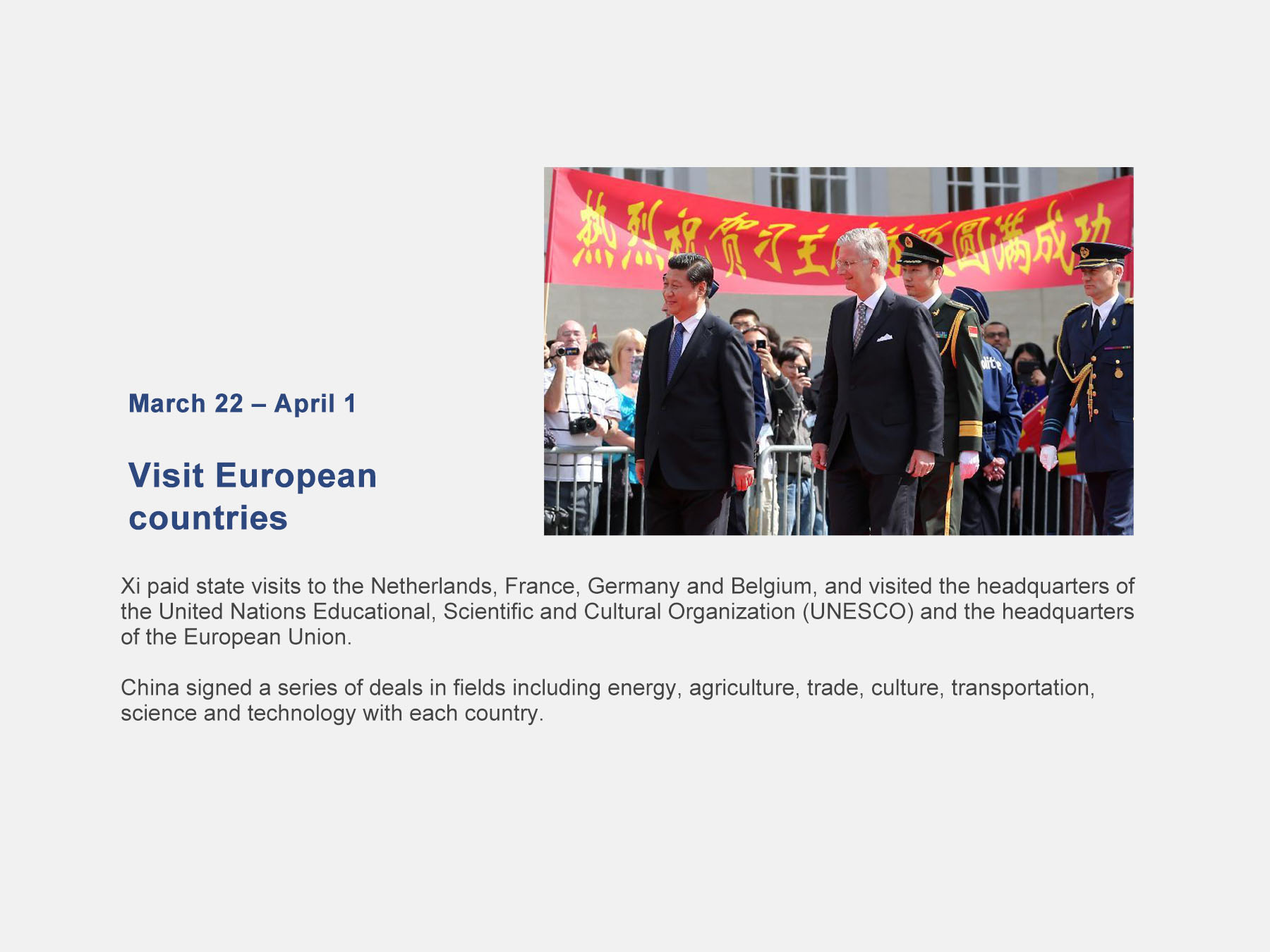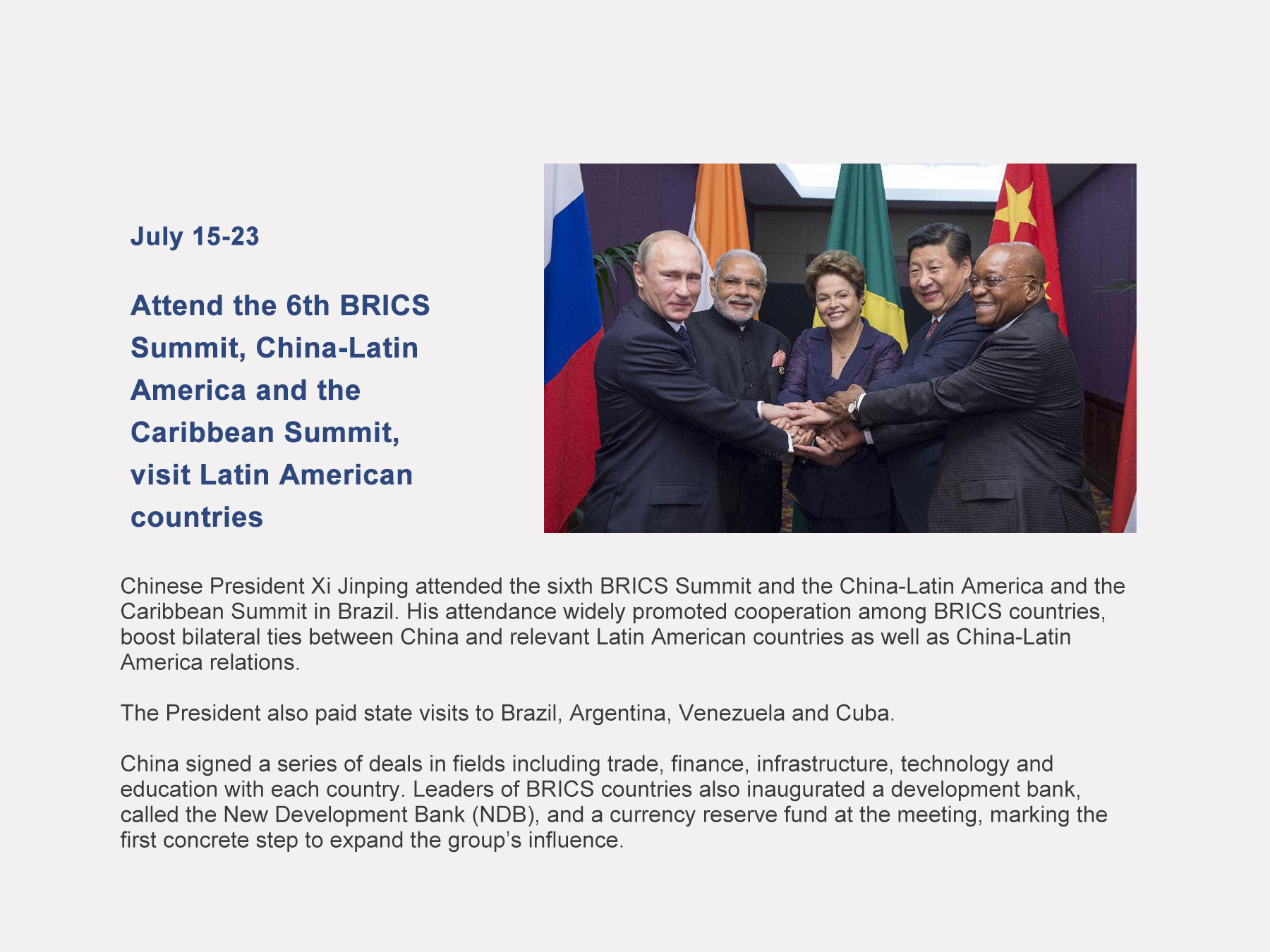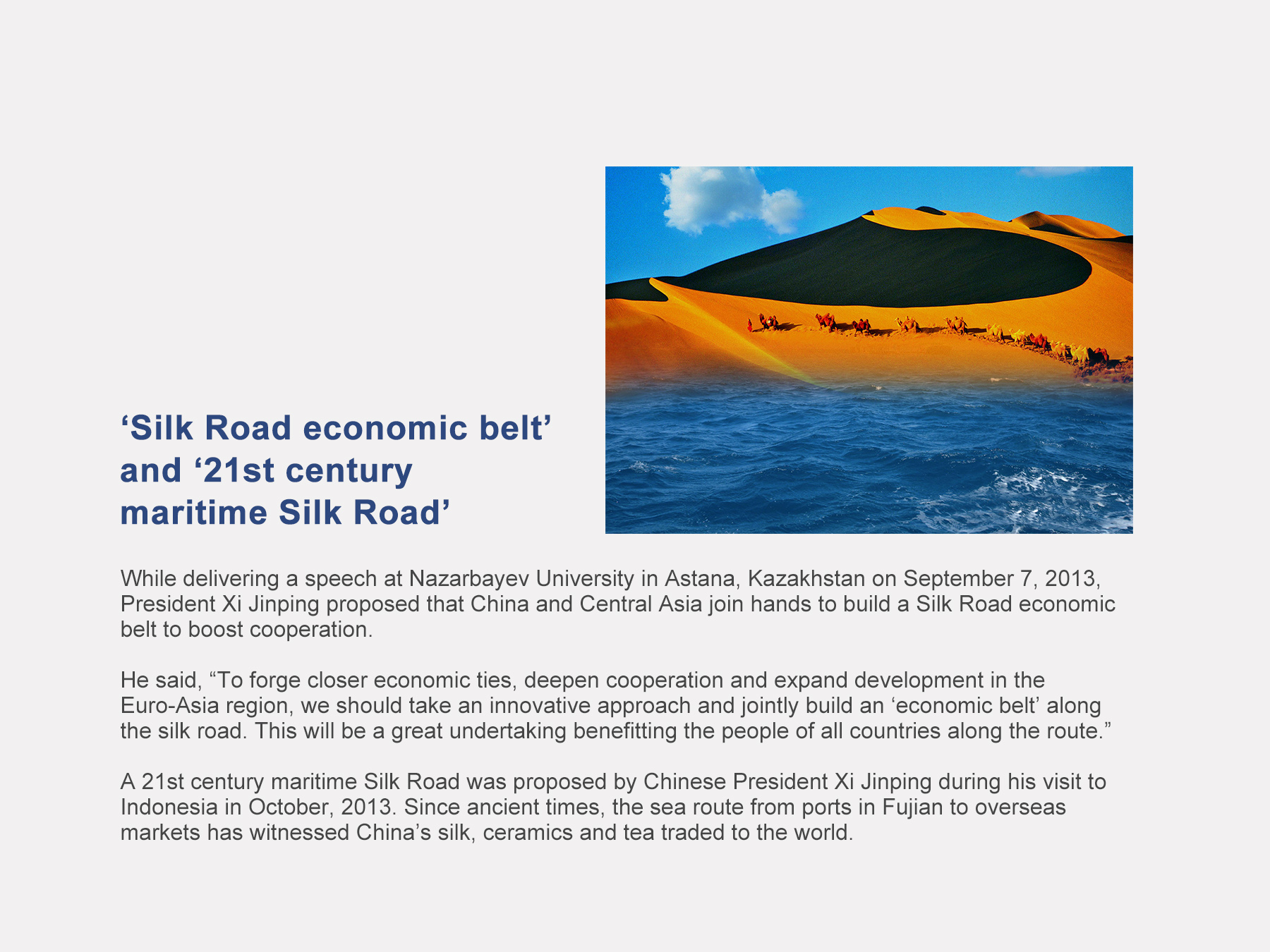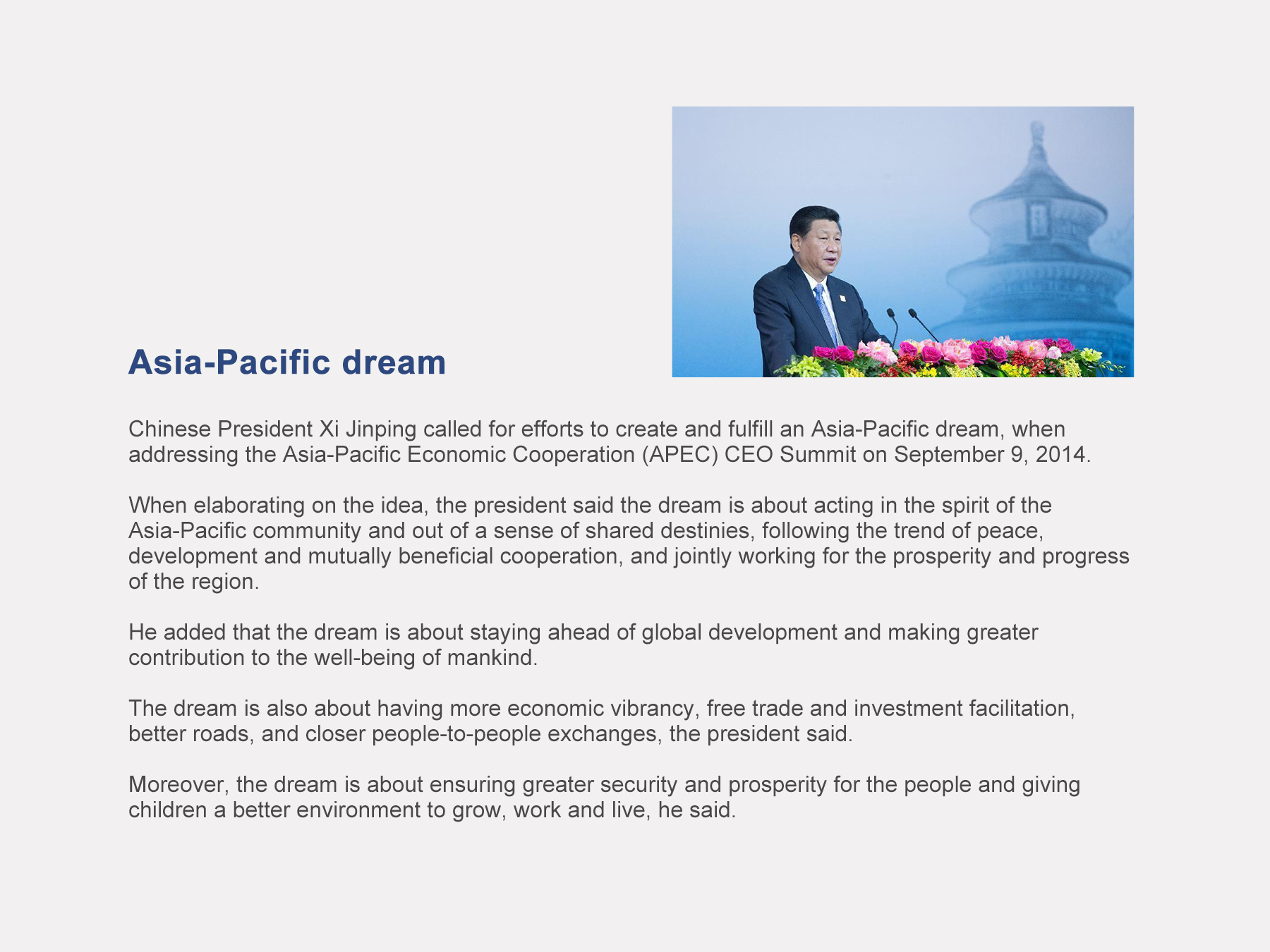or mouse to navigate Swipe
to navigate
Press "F" to toggle fullscreen
1.‘Acupoint’ diplomacy
2.Security concerns
3.Economic cooperation
4.New diplomatic policies
5.Upgraded partnership
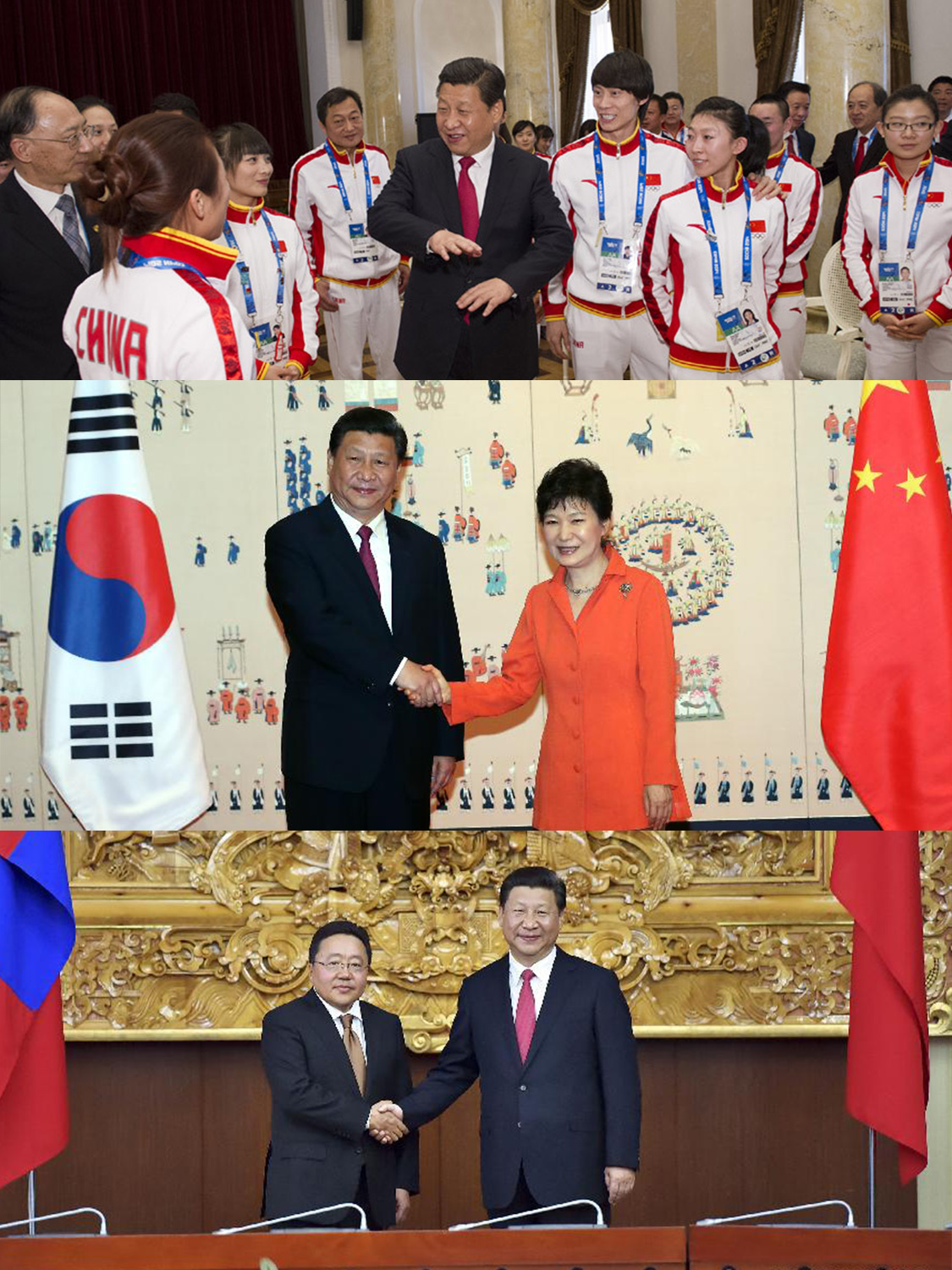
‘Acupoint’ diplomacy
President Xi Jinping attended 12 bilateral and multilateral events during his 43-hour state visit to Russia starting on February 6, 2014, dubbed as “acupoint” visits by Foreign Minister Wang Yi in his speech on February 9.
“Acupoint” diplomacy is highly efficient. Paying a visit to one country within a short time helps to concentrate on issues relevant to both countries while promoting bilateral cooperation, such as Xi’s visits to South Korea from July 3 to 4 and Mongolia between August 21 and 22.
February 6, Sochi 2014 Winter Olympic Games

Security concerns
President Xi Jinping placed increased importance on security issues in 2014. Xi put forward security-related issues not only during bilateral events, but also at two major summits and a meeting. His focal points included nuclear security, security in Asia and Asia-Pacific security cooperation.
March 22-April 1, Nuclear Security Summit, The Hague, the Netherlands
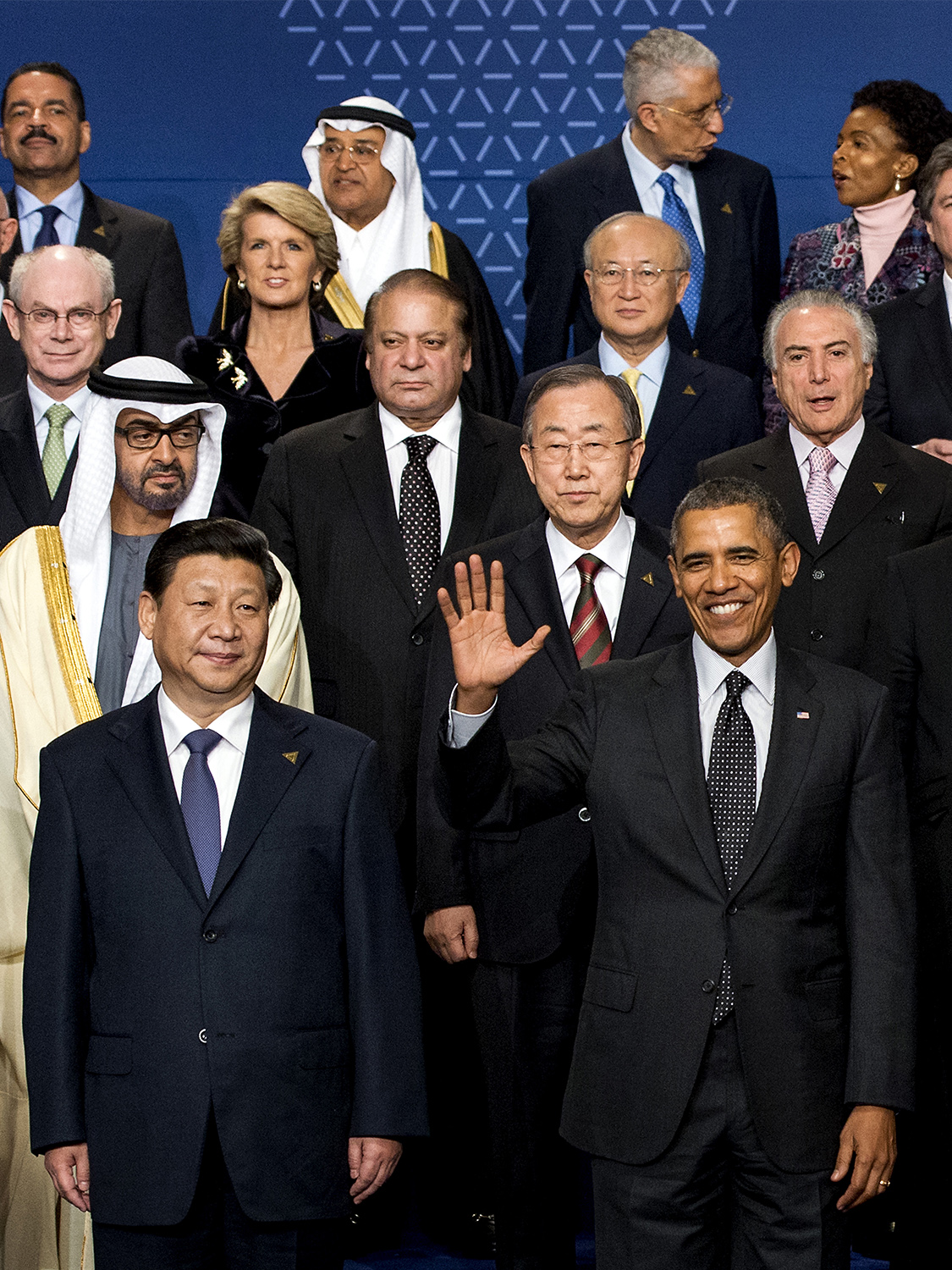
Economic cooperation
China signed deals in fields including energy, agriculture, trade, culture, science and technology, transportation with various countries while President Xi Jinping attended meetings and conducted state visits in 2014.
March 22-April 1, visit to European countries
September 11-19, SCO summit in Dushanbe, visit to Central and South Asia
November 15-23, Brisbane G20 summit, visit to Oceania countries
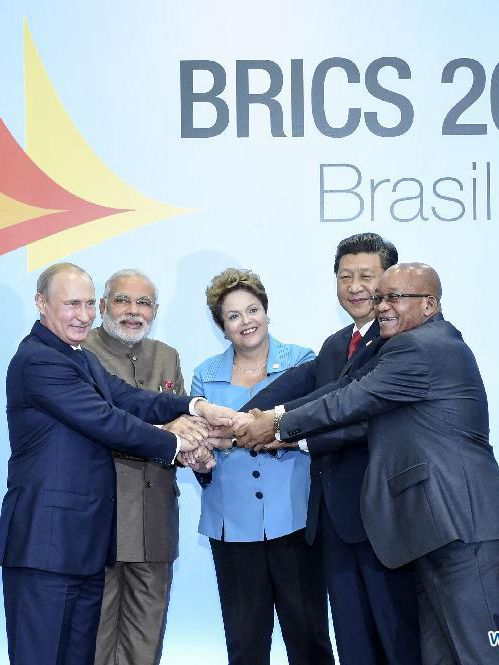
New diplomatic policies
Leveraging China’s historical role in Asian trade, the idea of “one belt and one road” is seen as a way to revive economic ties established with the ancient Silk Road. While China’s “Asia-Pacific dream” is about acting in the spirit of the Asia-Pacific community and out of a sense of shared destinies.
‘Silk Road economic belt’ and ‘21st century maritime Silk Road’
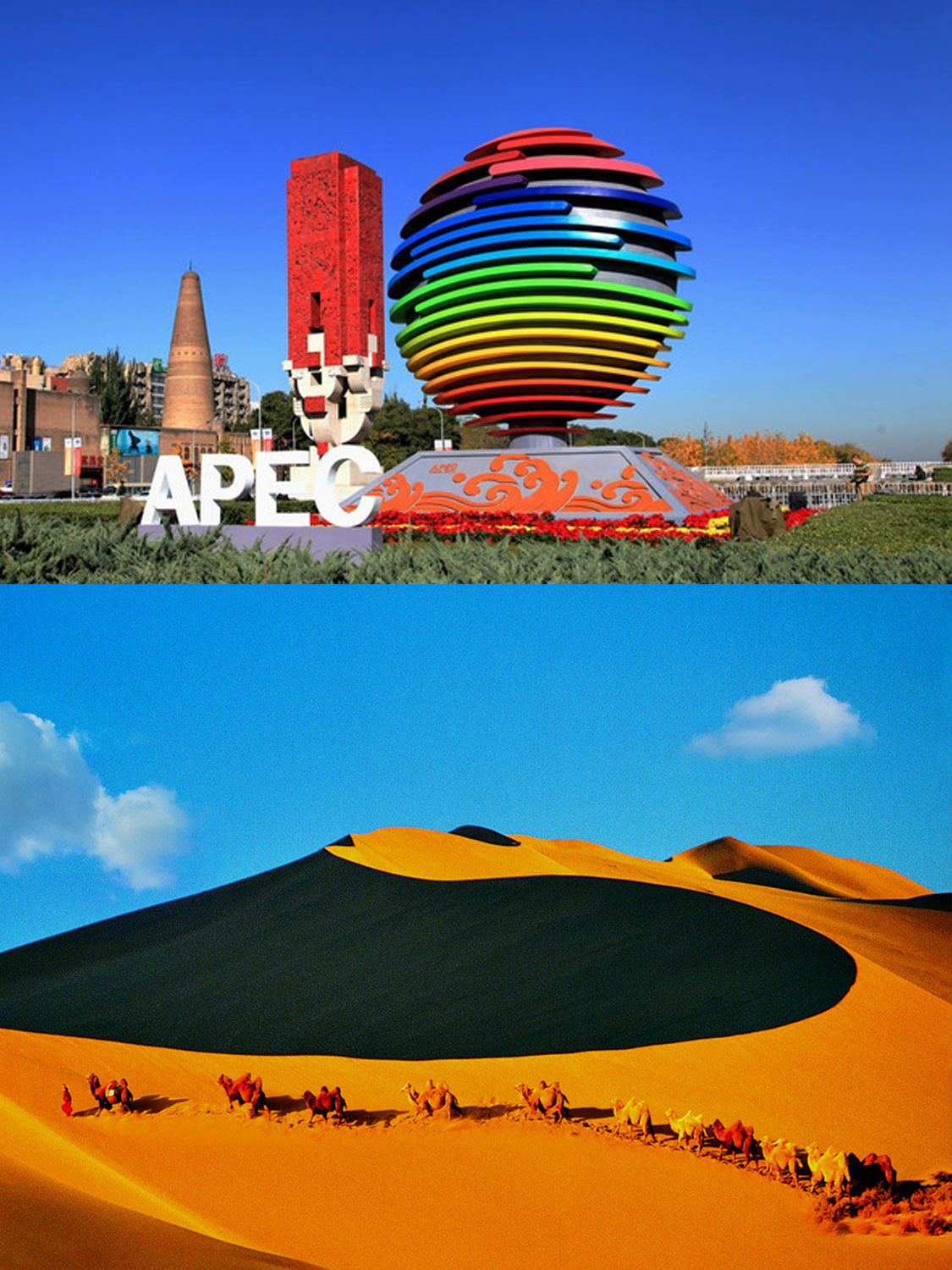
Upgraded partnership
China is playing a more active diplomatic role and improving its partnerships all over the world. President Xi Jinping upgraded diplomatic partnerships with 16 countries in 2014 during his many diplomatic activities.
Comprehensive strategic partnership
Comprehensive cooperative partnership
All-round strategic partnership
All-round partnership of friendship and cooperation
Strategic partnership
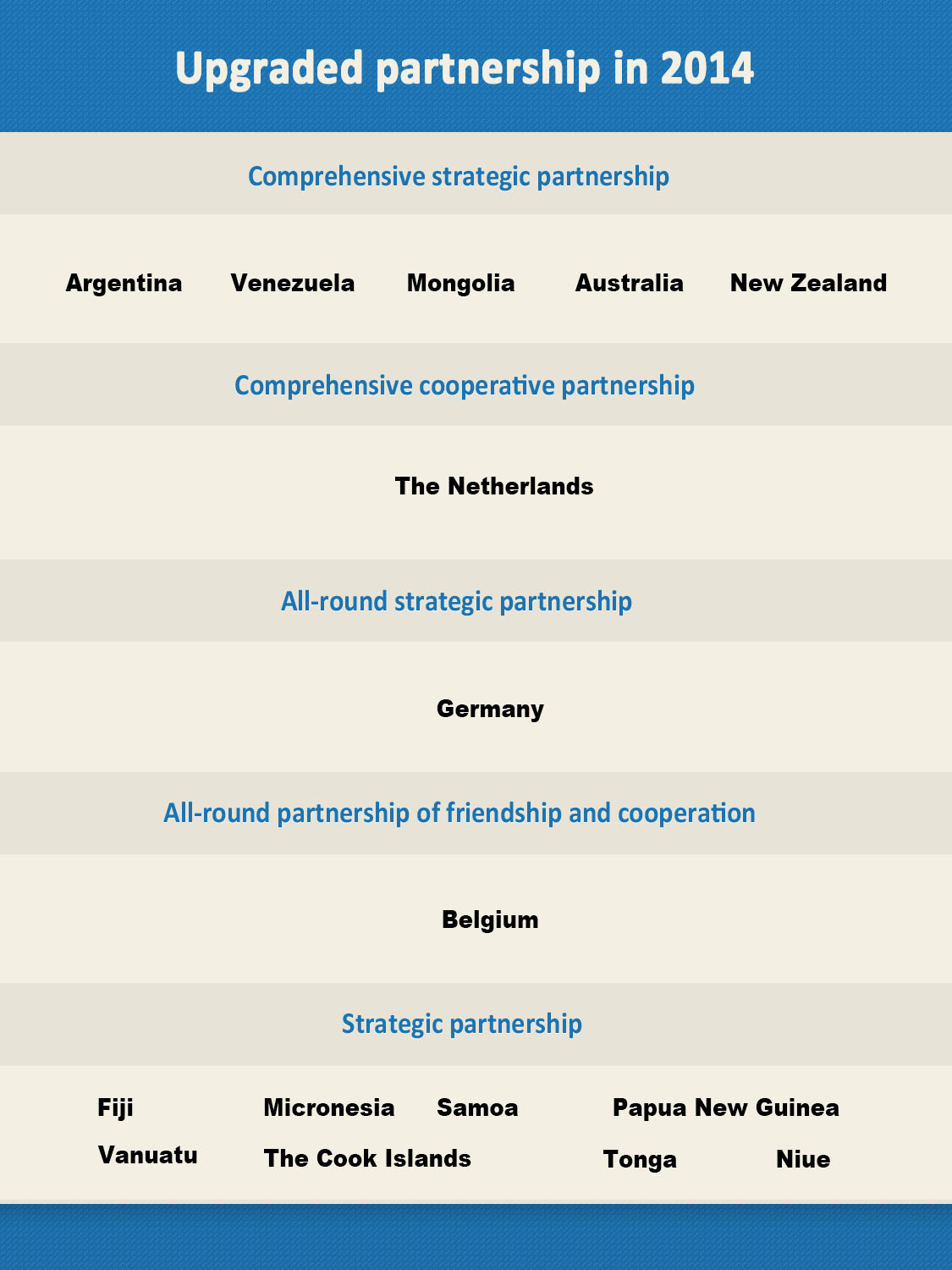
1.New normal
The term gained ground in China when President Xi was during his inspection tour in Central China’s Henan Province in May, 2014. In his speech delivered at the APEC CEO Summit on November 9, Xi, for the first time ever, sketched out a full picture of Chinese economy’s “new normal.”
“A new normal of China’s economy has emerged with several notable features,” the President said. First, the economy has shifted gear from the previous high speed to a medium-to-high speed growth. Second, the economic structure is constantly improved and upgraded. Third, the economy is increasingly driven by innovation instead of input and investment, he added.
2.Overall reform
The leading group for overall reform, headed by President Xi Jinping, has promoted reform in many areas this year, such as approving a framework for pilot programs of judicial reform, passing a proposal on the requirement and tasks for China’s legislative works, and a report on the reform of economic and bio-ecological systems.
The leading group, set up on December 30, 2013, is committed to research and decide major guidelines, policies and schemes for systematic reforms in economic, political, cultural, social and environmental fields, as well as the Party system. It has six sub-groups for reforms in six areas, including economy and ecology, democracy and law, culture, social, Party building and discipline inspection.
3.Overall national security outlook
Xi appealed to adhere to an overall national security outlook and explore a “national security path with Chinese characteristics,” while chairing the first meeting of national security commission on April 15, 2014.
To implement the overall national security outlook, China must attach importance to both external and internal security. Domestically, China will pursue development, reform, stability and foster a safe environment, Xi said. Externally, the country will seek to achieve peace, cooperation, win-win situations and a harmonious world, he said.
Xi also said China will build a national security system that covers the spheres of politics, territory, military, economy, culture, society, science and technology, information, ecology, nuclear, and natural resources. China will not only pay attention to its own security, but also to mutual security, he added.
4.Beijing-Tianjin-Hebei coordinated development
Xi said that the coordinated development of Beijing, Tianjin and Hebei is a national strategy of great significance at a symposium on February 26 in Beijing. Xi said that integrated development should be based on the comparative advantages and modern industrial divisions of each region, and that it must seek cooperation and win-win situations.
In order to promote the integrated development, the State Council established the leading group of the Beijing-Tianjin-Hebei coordinated development program in August, with Vice Premier Zhang Gaoli as the group leader.
5.New-type media groups
President Xi Jinping said on August 18, 2014, that China will build several new-type media groups that are strong, influential and credible.
Traditional media and new media must complement each other, and their integration should cover content, channels, platforms, operations and management, Xi said. Integration should be supported by technology and follow communication rules and laws governing the development of new media.
6.Rule of law
Rule of law, the policy adopted at the fourth plenary session of the 18th CPC Central Committee on October 23, 2014, stresses the supreme authority of the Constitution, and promises sweeping changes to the judicial system.
The CPC leadership is the fundamental protector of rule of law, and the Constitution is the fundamental law. Government officials must now pledge their allegiance to the Constitution before taking office.
Xi said the Party must comprehensively promote rule of law to build a well-off society, to deepen reform and to achieve the Chinese dream of a rejuvenated nation.
The decision was drafted by a group headed by Xi and his two deputies, Zhang Dejiang, top legislator, and Wang Qishan, secretary of the Central Commission for Discipline Inspection of the CPC.
7.Anti-corruption
When addressing the third plenary session of the CPC Central Commission for Discipline Inspection on January 14, 2014, President Xi stressed zero tolerance of graft and promised to seriously punish every corrupt official caught.
As of November, nearly 40 officials above the provincial level have been removed from their posts, such as the ex-security chief Zhou Yongkang and former military leader Xu Caihou. The Central Commission for Discipline Inspection set three rounds of inspections this year. The first two rounds inspected 20 provinces, regions and autonomous cities, as well as six organizations, revealing corruptions mainly on construction projects and land development. The third round started in late November for 13 state organizations, including the Culture Ministry, China State Shipbuilding Corporation, China Unicom and Sinopec.
China also increased its efforts in catching fled officials. The “Fox Hunt 2014” operation has so far seized 396 suspects allegedly involved in economic crimes in 58 countries and regions.
8.Cyber power
“Efforts should be made to build our country into a cyber power,” Xi said at the meeting of the central Internet security and informatization leading group on February 27, 2014.
In Xi’s view, building a cyber power calls for domestically developed technology, rich and comprehensive information services, a prosperous cyber culture, sound infrastructure, high-caliber talent working in Internet security and information, as well as international cooperation.
The establishment of the central Internet security and informatization leading group, with President Xi Jinping being the leader, indicates the leadership’s determination to protect Internet security, preserve national interests and push forward the development of information technology.
9.Strong army
Chinese President Xi Jinping on March 15 stressed that the country’s military reform should be guided by the objective of building a strong army during the first plenary meeting of a leading group for deepening reform on national defense and the armed forces.
With “being able to combat and win battles” as the focus, Xi said the reform should target key problems in strengthening combat preparedness and weak links in honing combat effectiveness. Reform of the commanding system, power structure and related policies should be advanced to support the consolidation of national defense and the building of strong armed forces, according to Xi.
The People’s Liberation Army (PLA) has launched a series of exercises this year. A two-month exercise, named Kuayue-2014 Zhurihe, kicked off in June in North China’s Inner Mongolia Autonomous Region. According to reports of Hong Kong based Wen Wei Po, live-fire military exercises were conducted in waters of East China Sea, Bohai Sea, the Yellow Sea and South China Sea ahead of August 1, China’s Army Day.
10.Art of the people
“Artists should not lose themselves in the tide of the market economy nor go astray while answering the question of ‘whom to serve’…Socialist culture and art is, in essence, the culture and art of the people,” Xi said at a symposium on October 15, 2014, attended by some of the country’s most renowned writers, actors, playwrights and dancers in Beijing.
Xi called on artists to produce works that “disseminate contemporary Chinese values, embody traditional Chinese culture, reflect the Chinese people’s aesthetic pursuits, and are intellectual.”
Art should also have patriotism as its main theme and foster “correct viewpoints” of history, nationality and culture, according to Xi.
New normal
The term gained ground in China when President Xi was during his inspection tour in Central China's Henan Province in May, 2014. In his speech delivered at the APEC CEO Summit on November 9, Xi, for the first time ever, sketched out a full picture of Chinese economy's "new normal."
"A new normal of China's economy has emerged with several notable features," the President said. First, the economy has shifted gear from the previous high speed to a medium-to-high speed growth. Second, the economic structure is constantly improved and upgraded. Third, the economy is increasingly driven by innovation instead of input and investment, he added.
Overall reform
The leading group for overall reform, headed by President Xi Jinping, has promoted reform in many areas this year, such as approving a framework for pilot programs of judicial reform, passing a proposal on the requirement and tasks for China's legislative works, and a report on the reform of economic and bio-ecological systems.
The leading group, set up on December 30, 2013, is committed to research and decide major guidelines, policies and schemes for systematic reforms in economic, political, cultural, social and environmental fields, as well as the Party system. It has six sub-groups for reforms in six areas, including economy and ecology, democracy and law, culture, social, Party building and discipline inspection.
Overall national security outlook
Xi appealed to adhere to an overall national security outlook and explore a "national security path with Chinese characteristics," while chairing the first meeting of national security commission on April 15, 2014.
To implement the overall national security outlook, China must attach importance to both external and internal security. Domestically, China will pursue development, reform, stability and foster a safe environment, Xi said. Externally, the country will seek to achieve peace, cooperation, win-win situations and a harmonious world, he said.
Xi also said China will build a national security system that covers the spheres of politics, territory, military, economy, culture, society, science and technology, information, ecology, nuclear, and natural resources. China will not only pay attention to its own security, but also to mutual security, he added.
Beijing-Tianjin-Hebei coordinated development
Xi said that the coordinated development of Beijing, Tianjin and Hebei is a national strategy of great significance at a symposium on February 26 in Beijing. Xi said that integrated development should be based on the comparative advantages and modern industrial divisions of each region, and that it must seek cooperation and win-win situations.
In order to promote the integrated development, the State Council established the leading group of the Beijing-Tianjin-Hebei coordinated development program in August, with Vice Premier Zhang Gaoli as the group leader.
New-type media groups
President Xi Jinping said on August 18, 2014, that China will build several new-type media groups that are strong, influential and credible.
Traditional media and new media must complement each other, and their integration should cover content, channels, platforms, operations and management, Xi said. Integration should be supported by technology and follow communication rules and laws governing the development of new media.
Rule of law
Rule of law, the policy adopted at the fourth plenary session of the 18th CPC Central Committee on October 23, 2014, stresses the supreme authority of the Constitution, and promises sweeping changes to the judicial system.
The CPC leadership is the fundamental protector of rule of law, and the Constitution is the fundamental law. Government officials must now pledge their allegiance to the Constitution before taking office.
Xi said the Party must comprehensively promote rule of law to build a well-off society, to deepen reform and to achieve the Chinese dream of a rejuvenated nation.
The decision was drafted by a group headed by Xi and his two deputies, Zhang Dejiang, top legislator, and Wang Qishan, secretary of the Central Commission for Discipline Inspection of the CPC.
Anti-corruption
When addressing the third plenary session of the CPC Central Commission for Discipline Inspection on January 14, 2014, President Xi stressed zero tolerance of graft and promised to seriously punish every corrupt official caught.
As of November, nearly 40 officials above the provincial level have been removed from their posts, such as the ex-security chief Zhou Yongkang and former military leader Xu Caihou. The Central Commission for Discipline Inspection set three rounds of inspections this year. The first two rounds inspected 20 provinces, regions and autonomous cities, as well as six organizations, revealing corruptions mainly on construction projects and land development. The third round started in late November for 13 state organizations, including the Culture Ministry, China State Shipbuilding Corporation, China Unicom and Sinopec.
China also increased its efforts in catching fled officials. The “Fox Hunt 2014” operation has so far seized 396 suspects allegedly involved in economic crimes in 58 countries and regions.
Cyber power
"Efforts should be made to build our country into a cyber power," Xi said at the meeting of the central Internet security and informatization leading group on February 27, 2014.
In Xi's view, building a cyber power calls for domestically developed technology, rich and comprehensive information services, a prosperous cyber culture, sound infrastructure, high-caliber talent working in Internet security and information, as well as international cooperation.
The establishment of the central Internet security and informatization leading group, with President Xi Jinping being the leader, indicates the leadership's determination to protect Internet security, preserve national interests and push forward the development of information technology.
Strong army
Chinese President Xi Jinping on March 15 stressed that the country's military reform should be guided by the objective of building a strong army during the first plenary meeting of a leading group for deepening reform on national defense and the armed forces.
With "being able to combat and win battles" as the focus, Xi said the reform should target key problems in strengthening combat preparedness and weak links in honing combat effectiveness. Reform of the commanding system, power structure and related policies should be advanced to support the consolidation of national defense and the building of strong armed forces, according to Xi.
The People's Liberation Army (PLA) has launched a series of exercises this year. A two-month exercise, named Kuayue-2014 Zhurihe, kicked off in June in North China's Inner Mongolia Autonomous Region. According to reports of Hong Kong based Wen Wei Po, live-fire military exercises were conducted in waters of East China Sea, Bohai Sea, the Yellow Sea and South China Sea ahead of August 1, China’s Army Day.
Art of the people
"Artists should not lose themselves in the tide of the market economy nor go astray while answering the question of 'whom to serve'…Socialist culture and art is, in essence, the culture and art of the people," Xi said at a symposium on October 15, 2014, attended by some of the country's most renowned writers, actors, playwrights and dancers in Beijing.
Xi called on artists to produce works that "disseminate contemporary Chinese values, embody traditional Chinese culture, reflect the Chinese people's aesthetic pursuits, and are intellectual.
Art should also have patriotism as its main theme and foster "correct viewpoints" of history, nationality and culture, according to Xi.
“By deepening reforms, we shall stimulate the vitality of essential factors in the market, such as labor, knowledge, technology, management and capital. These elements are all sources for creating social wealth.”
– Quoted from an article written by Xi for the People’s Daily published on January 1
“Past experience tells us that the greatest difficulty in correcting negative trends is to prevent their return. … While educational practice activities last for a certain period, the implementation of the mass line is endless and work style construction is to be always on the working agenda.”
– Said Xi at a “mass line” campaign conference on January 20
“In dealing with existing problems and prevent potential ones, we shall overcome and solve them one by one. Every move we make is to be quick and stable, and it is also important to attack them skillfully, in the most appropriate way at the right moment.”
– Said Xi presiding the first meeting of the leading group for overall reform on January 22 in Beijing
“China’s over-30-year reform has come into a period of increased development, a time when the easy changes have already been made and the difficult ones remain. The remaining challenges are to be met by someone both bold and steadfast. Boldness means to promote reforms even when they are difficult and risky. Steadfastness requires finding the right direction in the fast move ahead, and tries best to avoid subversive mistakes.”
– Said Xi during an interview for Russian TV on February 7 in Sochi, Russia
“Work style construction is always on the working agenda. Only tackling the problem either at the beginning or the end will result in one step short of success. Cadres at every level must adopt a positive work style, be disciplined in work and truthful in life.”
– Said Xi at a panel discussion during the 12th National People’s Congress on March 9
“Terrorism is the enemy of all human beings. China is willing to cooperate with international society, including the US, to fight terrorism by all means.”
– From Chinese President Xi Jinping’s phone conversation with US President Barak Obama on March 10
“It is important to make full use of two weapons: criticism and self-criticism. Exposing some ‘spicy’ information to sweat out Party officials is a means to encourage self-reflection and self-improvement.”
– Said Xi in Lankao county, Henan Province on March 18
“Where light inches forward, darkness retreats. The more we do to enhance nuclear security, the less chance we will leave to the terrorists.”
– From Chinese President Xi Jinping’s speech at the Nuclear Security Summit 2014, The Hague, Holland, March 24
“Napoleon Bonaparte once compared China to a ‘sleeping lion’ and observed that ‘when she wakes she will shake the world.’ Now China the lion has awakened, but it is a peaceful, amicable and civilized lion.”
– From Chinese President Xi Jinping’s remarks at the 50th Anniversary of the Establishment of China-France Diplomatic Relations in Paris, France on March 27
“Some people are prejudice toward China, mainly because of differences and misunderstandings. It is far from enough to understand China based on one part, otherwise it would be like making an overall judgment of something based on a one-sided viewpoint. An introduction to China should be characteristic and well-rounded, including ancient and modern civilization, economic development and prosperous culture.”
– From Chinese Xi Jinping’s talk with German sinologists, teachers and student representatives at the Confucius Institute in Berlin, Germany on March 29
“China is a big country with a population of more than 1.3 billion, like a big man in the crowd. Other people will undoubtedly watch how the big man walks and moves, and be concerned about whether he will bump into them, block their way or stand in their spot. China adheres to peaceful development, and will not waver in this resolution.”
– From Xi Jinping’s speech at the Federal Parliament of Australia on November 17
“Pandas are envoys of friendship. Xing Hui and Hao Hao come to Belgium, bringing with them the Chinese people’s deep feelings for the Belgian people. … We hope the children of Belgium love Xing Hui and Hao Hao, and will develop a fondness for China and Chinese culture.”
– From Xi Jinping’s remarks at the Opening Ceremony of Panda Garden with King Philippe of Belgium in Brussels on March 30

